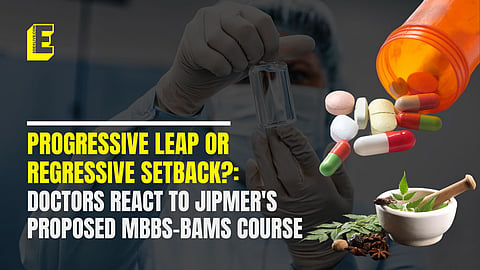

The announcement by the Union Government to introduce an integrated MBBS-BAMS course at the Jawaharlal Institute of Postgraduate Medical Education and Research (JIPMER) has sparked significant debate within the Indian medical community.
The Union Minister of State for Health and Family Welfare and AYUSH (Independent Charge), Prataprao Jadhav, had announced the government's proposal to introduce a new integrated medical course combining MBBS (Bachelor of Medicine, Bachelor of Surgery) and BAMS (Bachelor of Ayurvedic Medicine and Surgery) at JIPMER, according to The New Indian Express report.
The proposal, still in its conceptual phase, has received a mixed reaction from the medical community. While some doctors claim that this will be a detrimental step, others think it is necessary.
Through a press release dated May 30, 2025, the Indian Medical Association (IMA) demanded that the government withdraw the "regressive" proposal in the interest of public health.
Dr Dhruv Chauhan, National Spokesperson of the Indian Medical Association - Junior Doctors Network (IMA JDN), expressed concern that integrating two unrelated medical paths might harm the country's scientific temperament.
"We have raised this issue with the concerned ministry. We don't want this to happen because it can be detrimental to the nation's healthcare, and Mixopathy is very demotivating for future modern medicine aspirants," he said.
Dr Dhruv added that it would increase unnecessary competition. It might also create a sense of discrimination among allopathy students who toiled very hard to secure their seats, only to find that others who haven't achieved the same level of merit, are enrolled in the same course.
“If someone really wants to practice modern medicine, why don't they do MBBS and then join? Why do they want a shortcut or a bridge course? We are against this bridge course system,” he commented.
Dr Suvrankar Datta, Faculty Fellow, Koita Centre for Digital Health at Ashoka University, and a Gold Medalist from JIPMER, Puducherry, echoed Dr Dhruv's opinion.
"We don't think there is any scientific basis for mixing the two sciences. I don't think it has been put on paper yet; the ministry has discussed it. No doctor or administrator from a scientific background could put together something like this without endangering the patients," he remarked.
Meanwhile, some doctors have differing opinions.
Dr Rishikesh Nagar, MD (HOM) Scholar, Government Homeopathic Medical College (GHMC) And Hospital, Bhopal, observed that there had been collaborative internships between MBBS and AYUSH practitioners in Madhya Pradesh.
"During COVID-19, we understood that only one kind of system is insufficient for the whole population. Collaboration is necessary among all medical departments, as each has its pros and cons. The application differs from case to case. So, when doctors have an overview of the schools, one can refer and prescribe better," he said.
Dr Rishikesh suggested that an introductory or bridge course of at least six to seven months should be considered, if not the whole programme.
Dr Yogesh Yadav BAMS, MS, Assistant Professor, Department of Shalya Tantra, RN Kapoor Memorial Ayurvedic Medical College & Hospital (RNKMAMCH), Indore, also expressed that the integrative MBBS-BAMS course by JIPMER is not an isolated academic experiment but a natural evolution of national healthcare priorities.
He noted that the National Medical Council's 2022 mandate for Integrative Medicine Departments, the NEP 2020's push for interdisciplinary learning, and the 2023 MBBS curriculum's inclusion of AYUSH reflect a broader shift toward holistic education.
He pointed out that leading global institutions like Harvard and the Mayo Clinic already use integrative models, and the World Health Organization (WHO) has encouraged integrating traditional medicine into national health systems.
"Surveys and reports show many BAMS/AYUSH practitioners already prescribe allopathic drugs illegally, and MBBS doctors sometimes recommend Ayurvedic treatments without formal training. This programme brings regulation, standardised education, and accountability to a reality that already exists, preventing malpractice and protecting patients," he added.
The proposal has sparked strong support and serious concerns within the medical community.
While supporters see it as a step towards holistic and regulated healthcare, critics warn of risks to scientific integrity and patient safety.
Moving forward, careful consultation and planning will be crucial to address these conflicting perspectives.
